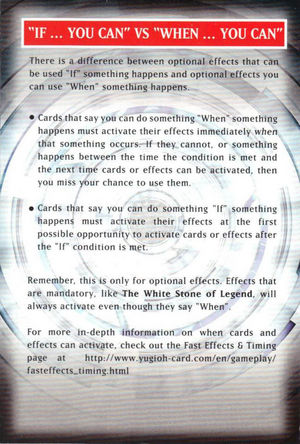If... You Can VS When... You Can

If... You Can and When... You Can are two timing-related phrases that appear in effects. Historically the phrase missing the timing has been used for this concept.
For optional effects which activate "when" an action occurs, that action must have been the last thing to happen in order for the player to activate that effect. If another action then occurs, the effect can be said to have missed its activation timing, and is unable to be activated.
Optional effects which activate "if" something occurs, or some other variation such as "each time", as well as mandatory effects, will activate their effects in the next possible chain, regardless of whether or not their activation conditions was the last thing to happen.
Contents
The Last Thing to Happen[edit]
Once you have identified whether or not the effect is an optional "when" effect, you must then identify what the last thing to happen is. There are many different things which will affect what the last thing to happen is, and it is also possible for multiple actions to all be the last thing to happen.
When a player takes an action that does not start a chain, that action is the last thing to happen. For example, setting a Spell/Trap Card, summoning a monster, or declaring an attack.
When a chain resolves, the last thing to happen is the resolution of the effect at Chain Link 1.
Conjunctions[edit]
Problem Solving Card Text will state which part of an effect is the last thing to happen when it resolves. The conjunctions "and", "and if you do", and "also", both parts of the effect (A and B) are considered to occur simultaneously, so both will be considered the last thing to happen. The conjunction “then” means that the second part of the effect (B) happens sequentially after the first part (A), so only B is the last thing to happen. However, if B is optional, and the player chooses not to perform this action, then A is the last thing to happen.[1]
Continuous Effects[edit]
Continuous effects do not interfere with timing. An action which is performed as a result of applying a continuous effect will also be the last thing to happen. For example, if the effect of your opponent’s “Maxx “C”” is applying and you perform a Synchro Summon, the last thing to happen is both the Synchro Summon AND the opponent drawing a card, and either action can be responded to in the next chain.[2]
Cost vs Effect[edit]
A cost is paid at activation, and happens sequentially before an effect. For example, if you discard "Jinzo - Returner" to activate "Lightning Vortex", the last thing to happen is the resolution of the effect of "Lightning Vortex", so the optional "when" effect of "Jinzo - Returner" cannot be activated.
Summons[edit]
Monsters which are used as material for a Synchro Summon, or otherwise used as material for a special summon, are first sent to the Graveyard, and THEN the summon occurs as the last thing to happen. For example, if "Laval Volcano Handmaiden" is used as material for a Synchro Summon, the last thing to happen is the Synchro Summon, not "Laval Volcano Handmaiden" being sent to the Graveyard, so its effect cannot be activated.[3]
Negated Activations[edit]
When an activation is negated, that chain link completely disappears, and does not resolve. For example, if "Heavy Storm" is activated at Chain Link 1, and "Magic Jammer" is Chain Link 2, when this chain resolves, "Magic Jammer" negates the activation of "Heavy Storm", and the last thing to happen is the activation of "Heavy Storm" being negated, and (since both parts of "Magic Jammer" are considered to occur simultaneously) "Heavy Storm" being destroyed.